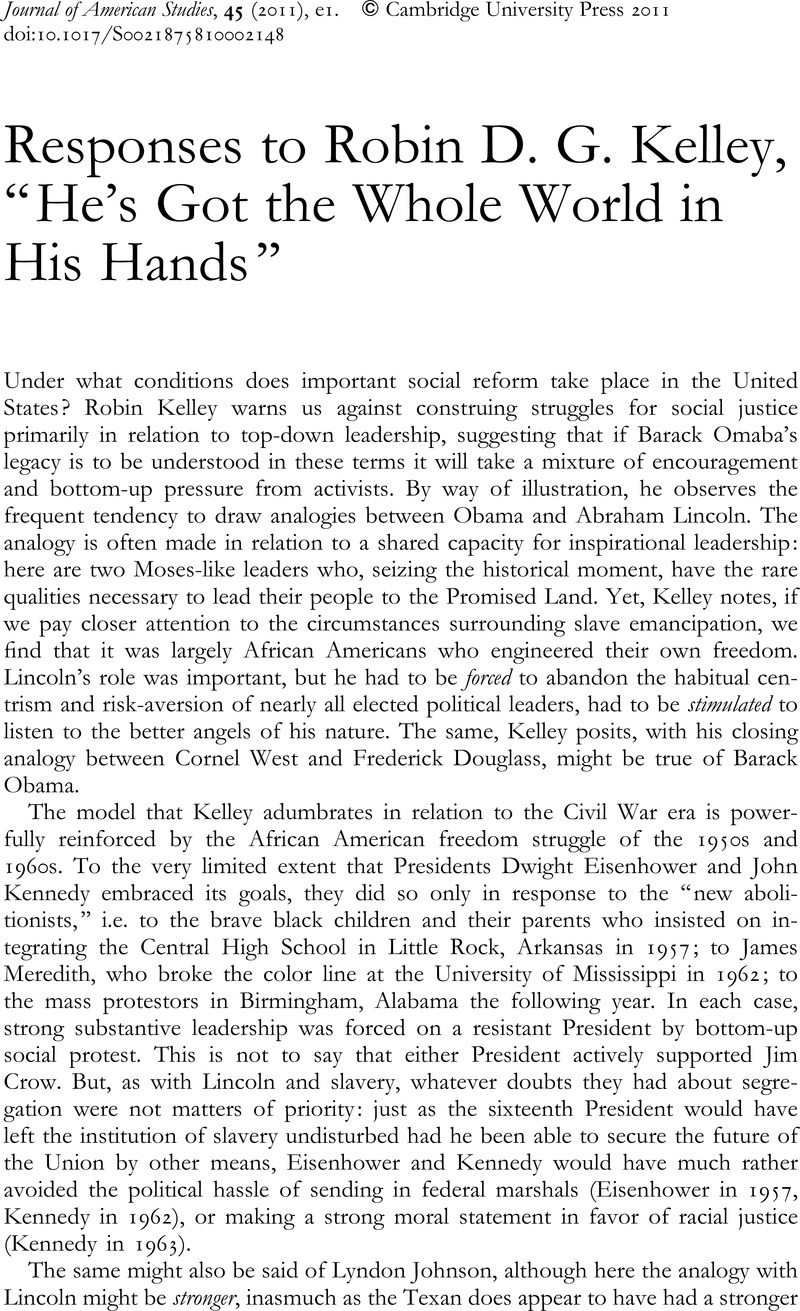No CrossRef data available.
Article contents
Responses to Robin D. G. Kelley, “He's Got the Whole World in His Hands”
Published online by Cambridge University Press: 03 March 2011
Abstract

- Type
- Round Table
- Information
- Copyright
- Copyright © Cambridge University Press 2011
References
1 On LBJ's support for Howe, see sources cited in Davies, Gareth , “Richard Nixon and the Desegregation of Southern Schools,” Journal of Policy History, 19, 4 (2007), 367–94CrossRefGoogle Scholar, 390 n. 7.
2 See especially Frances Fox Piven and Richard Cloward, Regulating the Poor: The Functions of Public Welfare (New York, 1971), 45–119; and idem, Poor People's Movements: Why They Succeed, How They Fail (New York, 1979), 41–180.
3 See Anthony Badger, The New Deal: The Depression Years, 1933–1940 (Basingstoke, 1989); William Leuchtenburg, Franklin D. Roosevelt and the New Deal (New York, 1963); Arthur Schlesinger, The Coming of the New Deal (Boston, 1959); David Kennedy, Freedom from Fear: The American People in Depression and War, 1929–1945 (New York, 1999).
4 This is why some New Left historians viewed the New Deal less as a response to bottom-up pressure than as a gift to American capitalism. See Paul Conkin, The New Deal (Arlington Heights, IL, 1967); and Barton Bernstein, “The New Deal: The Conservative Achievements of Liberal Reform,” in idem, ed., Towards a New Past: Dissenting Essays in American History (London, 1970), 263–88.
5 Piven and Cloward, Regulating the Poor, 183–99.
6 This is not the whole story, however. It is equally the case that Watts and subsequent disorders helped to ignite a strong conservative backlash that sharply diminished Johnson's capacity to pursue the Great Society.
7 The argument presented here is derived from Davies, Gareth , “War on Dependency: Liberal Individualism and the Economic Opportunity Act of 1964,” Journal of American Studies, 26, 2 (Aug. 1992), 205–31CrossRefGoogle Scholar.
8 Theda Skocpol, “Bringing the State Back In: Strategies of Analysis in Current Research,” in Peter B. Evans et al., Bringing the State Back In (New York, 1985), 3–43; John David Skrentny, The Minority Rights Revolution (Cambridge, MA, 2002).
9 The analysis in this section is drawn from Gareth Davies, See Government Grow: Education Politics from Johnson to Reagan (Lawrence, 2007); and idem, “Towards Big-Government Conservatism: Conservatives and Federal Aid to Education in the 1970s,” Journal of Contemporary History, 43, 4 (Oct. 2008), 621–35CrossRefGoogle Scholar.
10 See Joan Hoff Wilson, Nixon Reconsidered (New York, 1994); Robert Mason, Richard Nixon and the Quest for a New majority (Chapel Hill, 2004).
11 For a brief summary see Davies, See Government Grow, 105–08.
12 See Skrentny, Minority Rights Revolution.
13 Davies, From Opportunity to Entitlement, 38.
14 This was in his inaugural address, on 20 Jan. 1981, downloaded from www.presidency.ucsb.edu.
15 For Carter see James T. Patterson, Restless Giant: The United States from Watergate to Bush v. Gore (New York, 2005), 115–16; for Clinton see Davies, See Government Grow, 1; for Obama see James T. Patterson, Freedom Is Not Enough: The Moynihan Report and America's Struggle over Black family Life from LBJ to Obama (New York, 2010), 212–15.
16 For the American Revolution see Jesse Lemisch, “The American Revolution Seen from the Bottom Up,” in Bernstein, Towards a New Past, 3–45.




